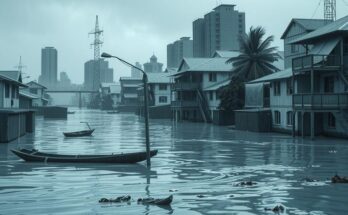Tropical Cyclone Chido has caused severe destruction in the Southwest Indian Ocean, resulting in 142 confirmed deaths and over 3,300 injuries. Major impacts were felt in Madagascar, the Comoros, Mozambique, and Malawi, affecting hundreds of thousands and leading to extensive infrastructure damage. Emergency responses are underway as the situation highlights the need for preparedness and resilience against increasingly intense cyclones.
Tropical Cyclone Chido has made a significant and destructive impact on the Southwest Indian Ocean, marking the onset of an early cyclone season deemed to be above average. Forming on December 11, Chido intensified to a Category 4 cyclone, exhibiting sustained winds of 220 km/h and gusts up to 250 km/h. The aftermath has resulted in at least 142 confirmed fatalities, primarily in Mozambique, Mayotte, and Malawi, alongside injuries exceeding 3,300. The cyclone severely affected Madagascar, with about 135,838 individuals projected to be impacted as heavy rains instigated flooding and infrastructure damage, compelling the evacuation of vulnerable communities.
In the Comoros Islands, the government instituted a week of mourning following the storm’s passage on December 14, affecting over 64,000 residents. The cyclone destroyed homes and disrupted agricultural activity, leaving a significant percentage of crops impacted. Mayotte experienced extensive destruction, with around 230,000 residents adversely affected, including the destruction of 35,000 houses and damage to vital services, including a hospital and airport, resulting in approximately 100,000 individuals residing in inadequate emergency shelters.
Mozambique reported approximately 622,000 individuals affected, particularly in Cabo Delgado, where severe shelter and infrastructure damage occurred. Similar devastation was noted in Tete, Nampula, and Niassa provinces, with over 130,000 shelters reported as damaged or destroyed. Furthermore, nearly 45,000 people in Malawi faced challenges due to the cyclone’s remnants, underscoring the ongoing need for disaster management and humanitarian support.
Currently, assessments are ongoing to ascertain total damages. The National Societies of the Red Cross and Red Crescent are engaged in essential responses including search and rescue operations, first aid provision, and family reunification efforts. However, the situation highlights the importance of preparedness and resilience amid increasing cyclone intensity. Consequently, this Emergency Appeal aims to gather resources for the IFRC network to provide humanitarian aid and enhance the operational readiness of National Societies during the active cyclone season.
Tropical cyclones pose a significant threat to regions such as the Southwest Indian Ocean, particularly during active seasons forecasted to be above average. The intensity and frequency of such cyclones have been on the rise, leading to higher risks of destruction and displacement, especially in vulnerable areas like the Mascarene Islands, Madagascar, Mozambique, and the Comoros. Preparedness and emergency response by humanitarian organizations are critical in mitigating the impacts of these natural disasters, which increasingly challenge local communities’ resilience. Cyclone Chido serves as a stark reminder of these ongoing challenges and emphasizes the need for enhanced infrastructural support and disaster management mechanisms.
In summary, Tropical Cyclone Chido has had devastating repercussions across several nations in the Southwest Indian Ocean, with significant loss of life, extensive injuries, and considerable infrastructure damage. It underscores the critical importance of preparedness, response capabilities, and resilience among affected communities amid rising cyclone threats. The collaborative efforts of local authorities, supported by humanitarian organizations, are essential in addressing immediate needs and reinforcing community resilience for future disasters.
Original Source: reliefweb.int




